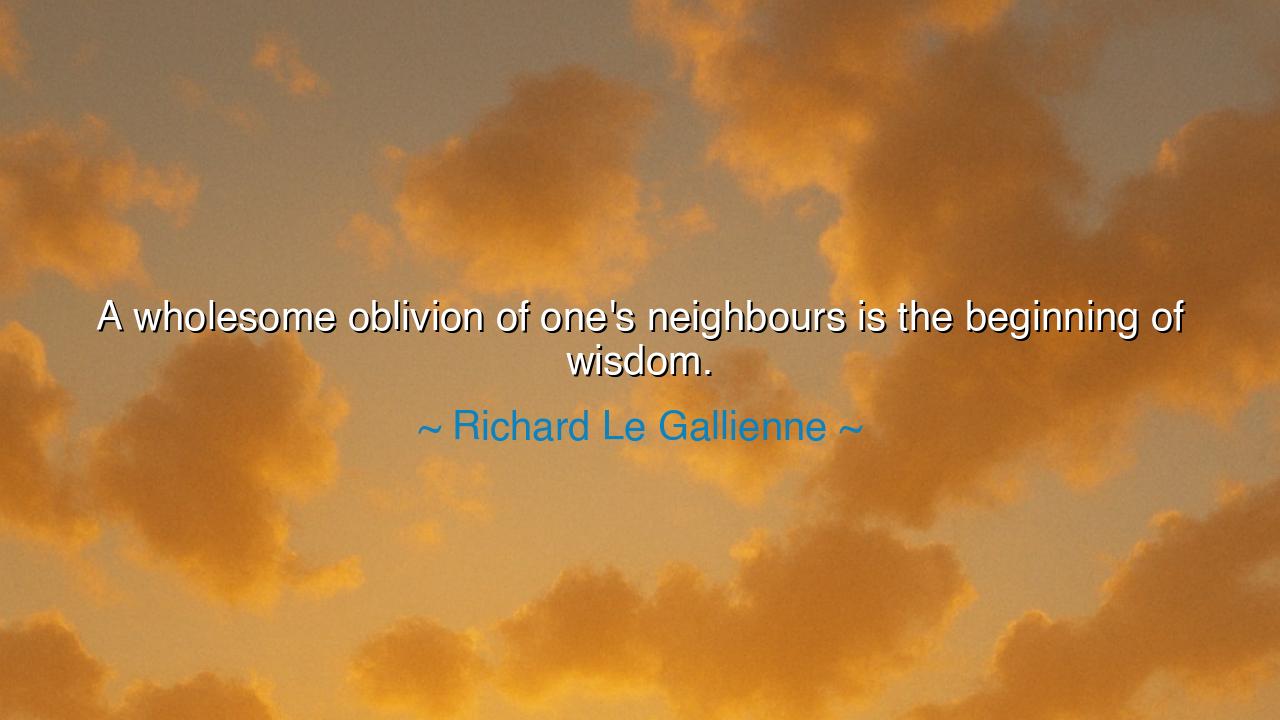
A wholesome oblivion of one's neighbours is the beginning of






Hearken, O children of contemplation, to the subtle counsel of Richard Le Gallienne, who speaks of the path to wisdom through a measure of oblivion. He declares that a wholesome oblivion of one’s neighbours—a conscious disengagement from the ceaseless chatter, judgments, and expectations of others—is often the first step toward true insight. Herein lies a paradox: to perceive the world with clarity, one must at times withdraw from the incessant influence of society, that the mind may breathe, reflect, and cultivate its own understanding.
The origin of this reflection lies in Le Gallienne’s life as a poet, essayist, and lover of quietude in the late nineteenth and early twentieth centuries. He observed the human tendency to be ensnared by the opinions and whims of neighbors, by the small cruelties and vanities of social life. From this observation, he concluded that true wisdom arises not from constant immersion in the affairs of others, but from the cultivation of inner contemplation, solitude, and the freedom to think independently.
The meaning of this aphorism is profound: while social bonds are necessary, an excessive concern with the judgments, behaviors, and expectations of others clouds perception and stifles the growth of the soul. By embracing a wholesome oblivion, one detaches from distraction and seeks the clarity that comes from untroubled reflection. It is in this sacred space, removed from noise and scrutiny, that insight, creativity, and moral understanding are most likely to flourish.
History provides testament to this teaching. Consider Henry David Thoreau, who retreated to the woods of Walden Pond, leaving behind the conventions, gossip, and pressures of society. In his seclusion, he cultivated reflection, moral discernment, and a profound understanding of the human condition, producing writings that have inspired generations. Thoreau’s oblivion of neighbors was not ignorance or arrogance, but a deliberate step toward wisdom, demonstrating the enduring truth of Le Gallienne’s insight.
Moreover, this lesson extends beyond writers and philosophers. The artisan who labors undistracted, the scholar who studies in quietude, and the thinker who contemplates in solitude all experience the power of selective detachment. By stepping away from the constant gaze of society, one nurtures a mind capable of deeper observation, profound insight, and a freedom of thought unattainable in perpetual entanglement with the trivialities of others.
O generations yet unborn, heed this counsel: cultivate a wholesome oblivion of that which distracts, and seek the sanctuary of reflection. In detachment, there is clarity; in solitude, there is growth; and in the measured withdrawal from the endless opinions of neighbors, one discovers the beginnings of wisdom, a light that illuminates both the self and the world with enduring insight.






BQNgo Gia Bao Quoc
I feel this quote challenges conventional views on social awareness. How much attention to others is constructive, and when does it become a barrier to independent thought? I wonder whether Le Gallienne is emphasizing psychological freedom, allowing one to focus on personal development without being constantly swayed by social pressures. Could this also imply that the first step to meaningful action or ethical judgment is cultivating a mind less influenced by trivialities and more focused on reflection, learning, and understanding?
KVKhanh Vu
This perspective raises questions about the role of solitude and reflection in personal development. Could a 'wholesome oblivion' mean creating mental space free from gossip, criticism, and societal distraction to cultivate clarity and insight? I’m curious whether this concept aligns with practices like meditation or philosophical contemplation. Does wisdom truly require turning inward and paying less attention to the opinions of others, or is there a point where engagement with the external world becomes essential for understanding and growth?
Uuetsdf
I find this statement provocative because it seems counterintuitive; we often associate wisdom with understanding others. Does Le Gallienne imply that obsession with others’ lives and opinions inhibits independent thought? I wonder how this principle applies to leadership, relationships, or communal living. Is it possible that ignoring neighbors metaphorically—focusing on oneself—can enhance decision-making and ethical judgment? At the same time, how do we balance self-directed growth with compassion and social responsibility?
VNCao Viet Nghia
Reading this, I feel intrigued and slightly unsettled. Is the author advocating for a literal ignorance of others, or is this more about prioritizing inner clarity and personal growth over external influence? I’m curious whether this approach might foster creativity and critical thinking by freeing one from social conformity. Could there be a philosophical or psychological basis for suggesting that occasional detachment from societal pressures is necessary to develop true insight or judgment?
VTNguyen Viet Thang
This quote immediately makes me reflect on the balance between self-focus and social awareness. Could Le Gallienne be suggesting that wisdom begins with a detachment from the distractions or judgments of others? I wonder if this implies a kind of mental independence that allows for clearer thinking and self-discovery. Is there a risk, though, that too much oblivion could lead to selfishness or social disengagement? How can one cultivate wisdom while still maintaining empathy and responsibility toward neighbors?